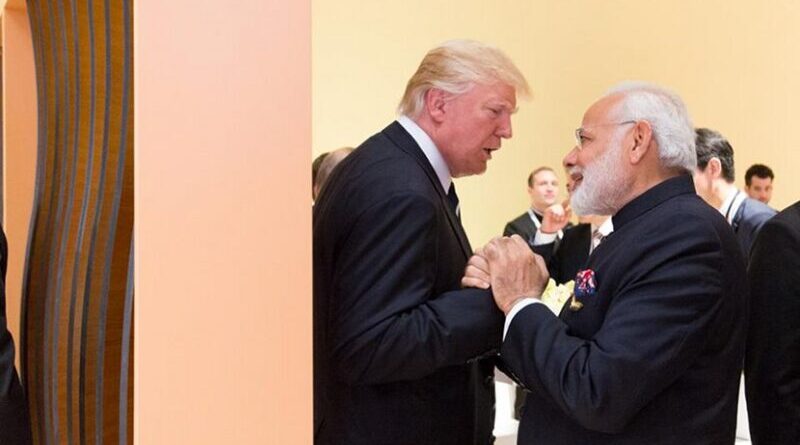New Delhi Loves Washington, But Washington Only Likes New Delhi – Analysis
By Observer Research Foundation
By Akshobh Giridharadas
There is a great analogy to describe the efficacy and the reach of certain think tanks. This applies more so in the case of certain India analysts obsessed with the Washington-New Delhi relationship.
The analogy being that imagine if there was a grand buffet at the palace. And over a hundred dishes are going to be served. A think tanker’s role is akin to an outsider who has somehow managed to find the ear one of the kitchen staff (policy planner inside government) working at the palace.
The think tanker informs the member of the catering committee that the best strawberries in town are found in one particular farmer’s market (policy advice). The kitchen staff heeds to the advice and decides to purchase those strawberries. These strawberries go into only one out of ten desserts along with the other ninety other items on the menu, including entrees, canapés and drinks (final policy outcome).
But think tankers assume that the guests at buffet would be able to notice their contribution of the strawberry recommendations that got bought and put into the making of the strawberry pudding.
Food hyperboles aside, the analogy was to highlight the limited impact of certain India focused think tankers both in Washington D.C and New Delhi when it comes to affecting policy discourse between the White House and Raisina Hill.
According to one leading South Asia analyst at a prominent Washington think tank, the fallacy lies with the India’s foreign policy brains and the subsequent India analysts at various think tanks in Delhi and Washington who “go rah-rah every time there is bilateral dialogue”.
Another India watcher is quick to concur and says that “India is just one part of the United States’ foreign policy outlook”. As Harvard academic Stephen Walt has described in his latest book, The Hell of Good Intentions, the United States has long followed a path of liberal hegemony. That is spreading what Washington sees as key economic and political freedoms across the globe.
And Washington is too preoccupied with its several political and economic interests that are more pressing in less stable parts of the world.
“India and the US relationship is a boring marriage spiced by the extra marital affairs of Pakistan and China” says one nuclear expert at a non-partisan think tank in D.C.
The fact of the matter is that “India is not a problem child, the State Department spends more time worrying about the problem child such as Iran, North Korea, Russia, China, Pakistan, Iraq, Syria, Yemen, Saudi Arabia and other countries” says a political science professor at a leading Washington based policy school. He goes on to add that “India, sort of has the stability factor as the United Kingdom, France or Australia when it comes to geopolitical relations with Washington. Of course, once in a while there will be issues on trade, which have to be ironed out and regular bilateral meetings will take place to reinforce the robust partnership”.
A former State Department officer who served in Islamabad and New Delhi and now works in the private sector said “at State, we always said if the US is not thinking about you, then you’re doing something good. The less we think about you, the less we have to worry about you” reinforcing Washington’s quest to unfurl the liberal values on the various said ‘problem children’.
The recent 2+2 dialogue between the respective foreign ministers and defense ministers of the two countries in New Delhi reinforced the strong commitment between the world’s oldest and the world’s largest democracy. The relationship between Washington D.C and New Delhi seems robust enough that Indian foreign policy wonks are currently administration agnostic. The overarching feeling in New Delhi is that currently both Democrat and Republican administrations will continue to coalesce with India on defense, cultural exchanges, counterterrorism, intelligence sharing, and cyber security, of course minor differences notwithstanding.
The United States will continue to see India as a key partner in South Asia and within the wider framework of the Indo-Pacific and even view India as a democratic counterweight to China.
And hence everything remains ticket-boo especially in the New Delhi-Washington romance, despite its “boring marriage” status. However, another prominent think tanker and scholar cautions the need to celebrate it more than it should. He feels that plenty of other India analysts in D.C are so obsessed with the Indo-US relationship, that they assume that writing lucid 800-word Op-eds would be enough to slowly but significantly affect US-India policy discourse. “It’s as if the belief is that Secretary Mattis and Secretary Pompeo devour all the articles written on the said relationship and accordingly shape their South Asia viewpoint”, he says.
Of course, India and the US will have their standoffs and a bit of a brouhaha when it comes to New Delhi wanting Washington to put more pressure on Islamabad to take a firm stance on dealing with terror. Or Washington’s vexation with New Delhi for depending on Tehran for its energy needs in oil imports or continuing to buy arms from Moscow for its defense needs.
“India needs to stop obsessing with its relationship with the US” says another Washington based academic who agrees that minor differences in trade and various partnerships will not hinder the relationship. “It is a stable relationship, and once in a while, the State Department would need to extend an invitation to India to stroke any hairs that are standing up”. Akin to a property investor checking in to see if the investments are all intact.
The trouble is every time there is a bilateral discourse, it is the South Asia focused think tank analysts that get excited every time the US dials in to say hello.

